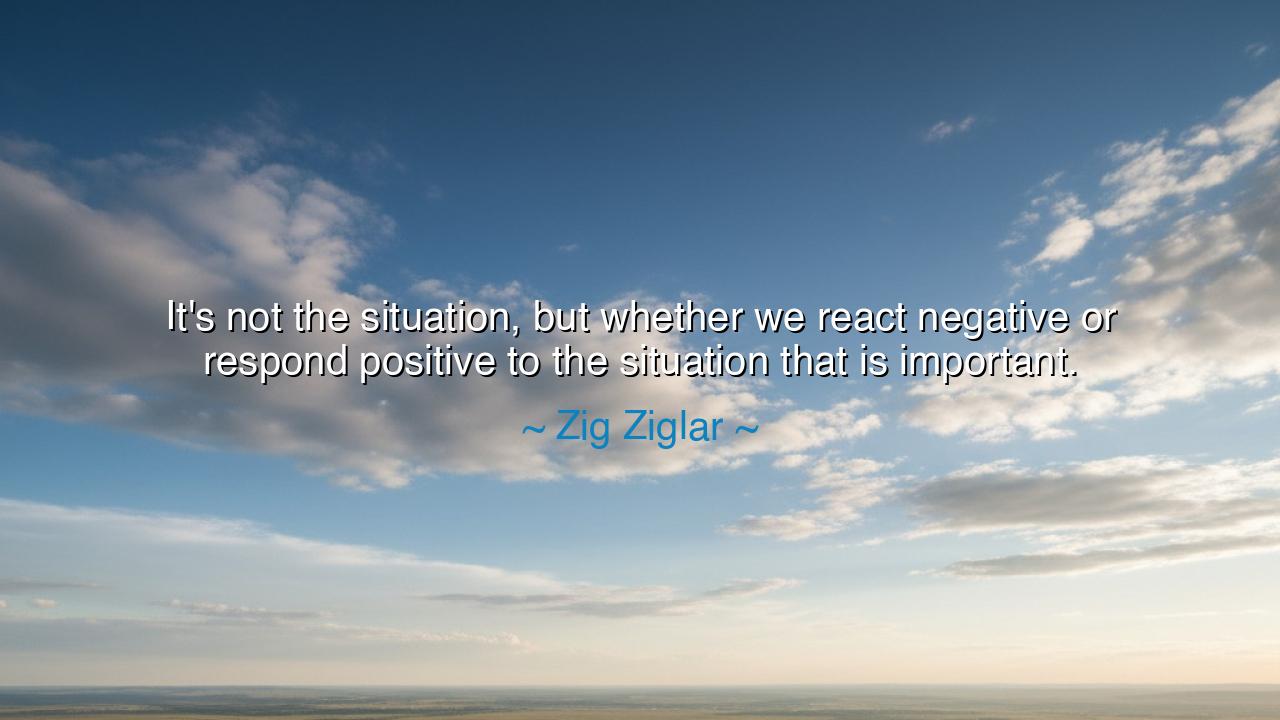
It's not the situation, but whether we react negative or respond
It's not the situation, but whether we react negative or respond positive to the situation that is important.






Hearken, O seekers of wisdom, to the words of the teacher Zig Ziglar: “It’s not the situation, but whether we react negative or respond positive to the situation that is important.” These are not idle phrases, but truths carved from the stone of human experience. The river of life will carry each soul through storms and trials, yet it is not the storm itself that determines the fate of the voyager—it is the hand upon the oar, the spirit within the chest, the choice to despair or to endure.
The ancients long knew this law. For they saw that men of equal strength faced the same misfortune, yet their destinies diverged. One cursed the heavens and withered, while the other lifted his eyes and found a path through the darkness. The situation was the same, but their responses were worlds apart. Thus, Ziglar’s words remind us: life is not bound by circumstance, but by the spirit’s answer to circumstance.
Consider the tale of Viktor Frankl, cast into the abyss of the concentration camps during the Second World War. Hunger, cruelty, and death surrounded him—an unimaginable situation. Yet Frankl, unlike many who perished in despair, chose to respond positive, clinging to meaning, holding fast to hope, seeing in suffering a seed of purpose. Later he wrote, “Everything can be taken from a man but one thing: the last of the human freedoms—to choose one’s attitude in any given set of circumstances.” Here the truth of Ziglar’s teaching shines with fire: the situation cannot dictate the soul unless the soul allows it.
When we react negative, we surrender our power. Fear, anger, bitterness—these are chains forged within, heavier than any imposed from without. But when we respond positive, even the cruelest fate loses its dominion. The battlefield may be soaked in mud and blood, yet the soldier who steadies his heart with courage transforms despair into triumph. This is why the ancients praised not those who avoided hardship, but those who met hardship with dignity.
Let no man or woman believe this path is easy. The natural impulse is to cry out, to strike back, to yield to despair. But discipline of the spirit is like the training of the body—strength comes only through resistance. By choosing a positive response again and again, the soul grows resilient, until even the fiercest storm cannot shake it.
The lesson is thus: we are not prisoners of situation, but masters of response. Each dawn, remind yourself: “Today I shall face trials. But my response shall be light, not darkness.” Practice patience when wronged, gratitude when deprived, calm when provoked. These are the exercises of the spirit that build unshakable strength.
Therefore, take these words as a covenant. Do not waste your days cursing what you cannot control, but wield your power over what you can—your choice of response. Speak kindness instead of wrath, choose hope instead of despair, answer injury with dignity instead of vengeance. In this way, you will shape not only your own destiny, but become a beacon for others lost in the storm.
And so, remember Ziglar’s wisdom: the situation is but the stage, fleeting and ever-changing. What endures is how you meet it. React negative, and you fall; respond positive, and you rise. The power rests always within your grasp.






LNLe Nhi
I feel inspired by this philosophy, but it raises questions about accountability and external circumstances. If someone consistently responds positively, does it influence outcomes or just their own experience? And how do we differentiate between responding positively and tolerating harmful or unjust situations? A deeper perspective on applying this approach effectively, without ignoring reality or compromising self-protection, would be very valuable.
TLDuong Thi Thuy Loan
This quote prompts me to consider the role of mindset in conflict resolution. How can individuals or teams cultivate the ability to respond positively even in tense or confrontational situations? Are there techniques from psychology or leadership development that help shift habitual reactions toward thoughtful, constructive responses? Exploring these methods could help translate this principle into actionable strategies for personal and professional growth.
KTK Tieu
I’m intrigued by the idea that our perspective shapes outcomes. Could focusing on responding positively rather than reacting negatively improve resilience, decision-making, and relationships? Conversely, is there a risk of suppressing natural emotions in an effort to stay positive? Understanding how to balance authenticity with constructive responses could provide practical guidance for navigating life’s unpredictable challenges.
KTMai Kieu Trinh
Reading this makes me reflect on the distinction between reaction and response. Is the key difference intention and mindfulness? How can one practice shifting from automatic negative reactions to conscious positive responses in stressful or high-pressure situations? I’d also like to explore whether this principle applies universally across personal, professional, and societal challenges, or if some contexts require more nuanced approaches.
NANguyen Nhat Anh
This perspective resonates, but I wonder how realistic it is to always respond positively. Are some situations so challenging or traumatic that negative reactions are unavoidable, and if so, does that mean the principle has limits? I’d like a perspective on how to cultivate a mindset that leans toward positive responses while still acknowledging legitimate emotional reactions. Can training or habits make positive responses more natural over time?